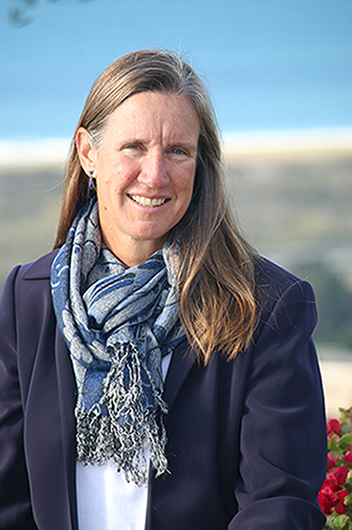 Nov. 3, 2017 — Her work to level the playing field for underrepresented minorities has earned CSU Channel Islands (CSUCI) Professor of Mathematics Cynthia Wyels, Ph.D., a 2017 Distinguished Mentor Award from the Society for the Advancement of Chicanos/Hispanics and Native Americans in Science (SACNAS).
Nov. 3, 2017 — Her work to level the playing field for underrepresented minorities has earned CSU Channel Islands (CSUCI) Professor of Mathematics Cynthia Wyels, Ph.D., a 2017 Distinguished Mentor Award from the Society for the Advancement of Chicanos/Hispanics and Native Americans in Science (SACNAS).
Wyels received the national honor at the 2017 National Diversity in STEM Conference in October in Salt Lake City, Utah.
“This is the most meaningful recognition I could ever imagine receiving in my professional career,” Wyels said. “This is about people. This is about doing what I can to help people find their paths and succeed.”
Wyels stressed that mentoring is a “we” and not an “I” activity and she could not have done as well with her students without a network of faculty, graduate students and others who rally to help her usher students of color into science, technology, engineering and math (STEM) fields they might never have dreamed they could master.
Wyels had no idea she had been nominated by a colleague, Alejandro Alvarado, Ph.D., Associate Professor of Mathematics at Eastern Illinois University. Four other faculty members from Massachusetts, Ohio, and CSUCI supported the nomination.
“Her definition of mentorship is not just advising students on research projects, or how to apply for graduate school,” Alvarado wrote in the nomination letter. “She encompasses compassion, caring, and preparation for the next step in the career ladder. She fosters intellectual and professional development among STEM professionals at every stage of their academic careers.”
Wyels is a believer in senior faculty helping newer faculty, so she mentored her junior colleagues as well.
Youngstown University Associate Professor of Mathematics & Statistics Alicia Prieto Langarica said that meeting Wyels when Langarica was a junior minority mathematician was one of the best things that ever happened to her.
“The year my tenure application was approved, she invited me to spend my spring break at CSUCI, to help refocus my career and to guide me through grant applications and help me brainstorm for my sabbatical proposal,” Langarica wrote as one of many thing Wyels did to help her succeed in academia.
Among many other projects, Wyels and CSUCI colleagues developed a minority-serving program called Research Experience for Undergraduates (REU) to guide students into mathematics research.
Letters of support from former REU students offered a glimpse into how far above and beyond Wyels went as a mentor.
Alejandra Castillo, who is working for her Ph.D. in Statistics at Oregon State University, remembers meeting Wyels at a SACNAS conference in Los Angeles.
“As a undocumented student, I had already been warned that REU Programs were out of my reach due to my citizenship status,” she wrote. “Dr. Wyels quickly mentioned that the Mathematics REU at CSUCI was undocumented student-friendly. She then talked about how a few of her past students, though undocumented, have continued to pursue careers in academia and industry. This entire conversation took place within the first 20 minutes after meeting Dr. Wyels and she has continued to change my life ever since.”
Crystal Mackey, who is studying for a Ph.D. in Mathematics at the University of Texas at Arlington, was struggling in her graduate program.
“In the beginning of graduate school I quickly felt overwhelmed about remaining in good standing and I did not feel like I belonged in school,” Mackey said. “I was ready to leave the program. I called Dr. Wyels looking for support and she inspired me to use all my resources such as professors’ office hours, and to continue to work hard.”
Wyels said that if she has been effective as a mentor, it’s because she and her network considered their jobs to be more than advising students on math research or grad school.
“You have to look at the whole person. It’s not just about the math,” she said. “Especially our first generation students and underrepresented minorities. All that context can be critically important.”
Wyels says she treasures all the letters, but especially the letters from former students.
“When I’m on my death bed reading these I’ll say ‘maybe I made a little bit of a difference,’” she said.
